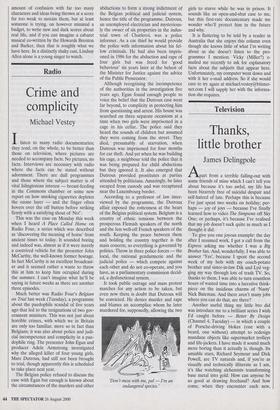Radio
Crime and complicity
Michael Vestey
Ilisten to many radio documentaries; they tend, on the whole, to be better than those on television, where pictures are needed to accompany facts. No pictures, no facts. Interviews are necessary with radio where the facts can be stated without adornment. There are dull programmes and those where the subject matter is of vital Islingtonian interest — breast-feeding in the Commons chamber or some new report on how smoking cigarettes depletes the ozone layer — and the finger often hovers over the off button before striking . firmly with a satisfying shout of 'Nor.
This was the case on Monday this week when I heard A Place Called Home on Radio Four, a series which was described as 'discovering the meaning of home' from ancient times to today. It sounded boring and indeed was, almost as if it were merely a contrived vehicle for the presenter John McCarthy, the well-known former hostage. In fact McCarthy is an excellent broadcast- er and it seemed rather a waste to throw this at him to keep him occupied during the summer. I can't imagine what he'll be saying in future weeks as there are another three episodes.
Much better was Radio Four's Belgium on Trial last week (Tuesday), a programme about the paedophile scandal of five years ago that led to the resignations of two gov- ernment ministers. This was not just about horrible crimes, with which we in Britain are only too familiar, more so in fact than Belgians; it was also about police and judi- cial incompetence and complicity in a pae- dophile ring. The presenter John Egan and producer Adele Armstrong investigated why the alleged killer of four young girls, Marc Dutroux, had still not been brought to trial, though apparently this is scheduled to take place next year.
The Belgian police refused to discuss the case with Egan but enough is known about the circumstances of the murders and other abductions to form a strong indictment of the Belgian political and judicial system, hence the title of the programme. Dutroux, an unemployed electrician and mysterious- ly the owner of six properties in the indus- trial town of Charleroi, was a police informer. As a car thief he would provide the police with information about his fel- low criminals. He had also been impris- oned in 1986 for the abduction and rape of four girls but was freed for 'good behaviour' six years later at the behest of the Minister for Justice against the advice of the Public Prosecutor.
Although recognising the incompetence of the authorities in the investigation five years ago, Egan found enough people to voice the belief that the Dutroux case went far beyond, to complicity in protecting him from questioning and arrest. His house was searched on three separate occasions at a time when two girls were imprisoned in a cage in his cellar. The police said they heard the sounds of children but assumed they were coming from the street. They died, presumably of starvation, when Dutroux was imprisoned for four months for car theft. And yet when he was building his cage, a neighbour told the police that it was being prepared for child abductions but they ignored it. It also emerged that Dutroux provided prostitutes at parties attended by politicians. Amazingly, he later escaped from custody and was recaptured near the Luxembourg border.
According to a professor of law inter- viewed by the programme, the Dutroux affair exposed the rottenness at the heart of the Belgian political system. Belgium is a country of ethnic tensions between the prosperous Flemish speakers of the north and the less well-off French speakers of the south. Keeping the peace between them and holding the country together is the main concern, so everything is governed by politics. Throw in three police forces — the local, the national gendarmerie and the judicial police — which compete against each other and do not co-operate, and you have, as a parliamentary commission decid- ed, a dysfunctional system.
It took public outrage and mass protest marches for any action to be taken, but even now there is doubt that Dutroux will be convicted. He denies murder and rape and blames an accomplice whom he later murdered for, supposedly, allowing the two Don't mess with me, pal — I'm an endangered species.' girls to starve while he was in prison. It sounds like an open-and-shut case to me, but this first-rate documentary made me wonder who'll protect him in the future and why.
It is flattering to be told by a reader in Australia that she enjoys this column even though she knows little of what I'm writing about as she doesn't listen to the pro- grammes I mention. Vicky (Miller?) e- mailed me recently to ask for explanatory facts about the subjects that appear here. Unfortunately, my computer went down and with it her e-mail address. So if she would care to try again at michael.vestey@btinter- net.com I will supply her with the informa- tion she requires.


























































 Previous page
Previous page